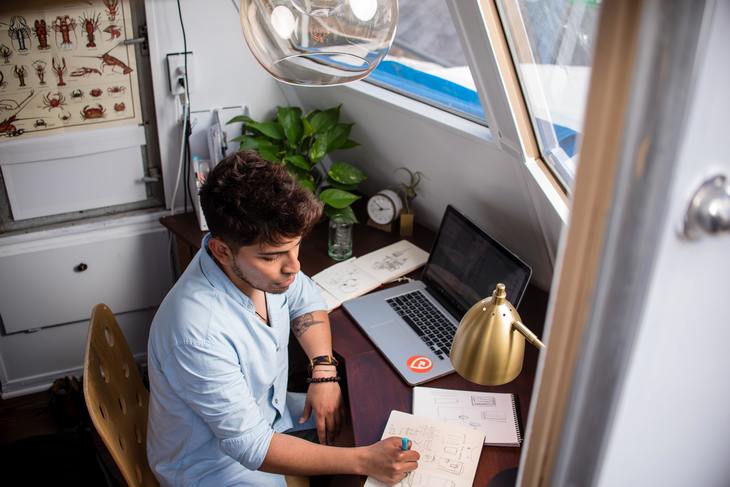For the next few months normality has been wiped from London. Aside from the catastrophic human cost of coronavirus, businesses have been shut and people incarcerated in their own homes. When it's all over — and who knows when that might be — there's no guarantee of "normality" returning. In all likelihood some businesses will remain shut. But beyond closed doors, London's way of life might change too. Below we look at some possible transformations the coming months could bring.
No more microhousing?
Twitter has been abuzz with people lamenting their pre-pandemic choice to live in a confined space. The logic at the time had been: 'It doesn't matter the size of my room, I'm going to be out in London 90% of the time anyway.'
Now that we're all locked indoors, that thinking has gone out the window. And while those who live in cramped houseshares in zone 2 with people they don't really know, nor do they want to know — no Gary, I don't want to play Fortnite with you — think they have it bad; they're only the tip of the iceberg. For example what about those who live in microhousing?
Living in preposterously small spaces, has become a fetishised ideal in recent times. Aesthetically pleasing Youtube channels promote "micro living" as an answer for overcrowding, and lack of affordable property in the modern city. But it's hard to imagine anyone who will be eager to sign up to live in such a limited space in a post-pandemic lifestyle.
More love for our green spaces

One of the byproducts of coronavirus life is a renewed focus on the city's green spaces. The government has come in for both criticism and praise for keeping parks open, arguing that the health benefits — both mental and physical — of keeping these spaces open, outweighs the risk of spreading the virus. This is in diametric opposition to what many other European countries have done. Some local authorities have taken matters into their own hands and closed their parks, a move which has caused an outcry of its own.
Right now there's plenty of talk of how cherished these spaces are, but that isn't always how they've been treated pre-coronavirus (see also the importance of the NHS). Lots of councils have made a regular habit of renting their green spaces out to music festivals and other private events. This denies regular use of the space to locals, while it also often damages the spaces themselves. Councils rent parks out because their budgets have been cut by years of austerity, and use these events to raise money for their other services. However, the order of which services people value most might be reshuffled by coronavirus, with parks set to benefit greatly in people's estimations. Perhaps we could see even greater resistance to privatisation of green spaces once this is all over.
Rental prices could come down

While no industry will come out of Covid-19 unscathed, one of the worst hit is surely travel. Countries are closing their borders, airlines are asking for a government bailout, and hotels are closing for the foreseeable future. But not everyone who travels uses hotels... at least, they didn't used to.
Short term holiday lettings companies like AirBnB had eaten a huge chunk of their market share. And while these companies began offering folks a way to make some extra cash from a spare room, they quickly morphed into something else entirely — entire properties were reserved for these sorts of lettings, eating into a finite resource the city doesn't have enough of: housing stock.
The government has tried to legislate to stop entire properties being used as short-term holiday lets year round, but the rules are frequently broken and rarely enforced. However, there are early signs that coronavirus has done what government legislation has failed to. The uncertainty in the travel market means that short term letting bookings have dried up, and these properties are now being put on the regular long-term rental market. There's early evidence that this influx of new property is being listed at cheaper prices than the market usually operates at. While this price undercutting probably won't last post-pandemic, the precariousness of the short-term lettings game might mean that property owners decide to stick to long-term lets instead. And an increase in the housing supply should push prices down.
Working from home becomes the norm

The changing of attitude to the three little letters 'wfh' was happening even before coronavirus — TfL had hypothesised that falling ridership numbers could be down to this — but the pandemic has the power to be the rapid catalyst that could change the way we work forever. First of all, let's clarify something. Not everyone can work from home, and it's often the essential workers (one side effect of the pandemic is unveiling who actually is key to society functioning) who can't.
But for the rest of us, especially those in the creative agencies, or with white collar jobs, working from home is eminently doable. In fact, for many of us, it's preferable (you can stay in your PJs all day, what's not to love!). With many London-transplants heading "home home" to wait out the pandemic somewhere with a garden, it's even raised the question of whether people need to move to London for their job.
Now as soon as this all blows over, we're sure many people will jump for joy at the idea of returning to the office... initially. But once that novelty of being out of the house wears off, perhaps you'll experience a yearning for the relaxed pace of that wfh life.
Bidets become a bathroom essential

No toilet paper, no worries!
Do you have any predictions for how coronavirus could change the city forever? We'd love to hear them in the comments below




